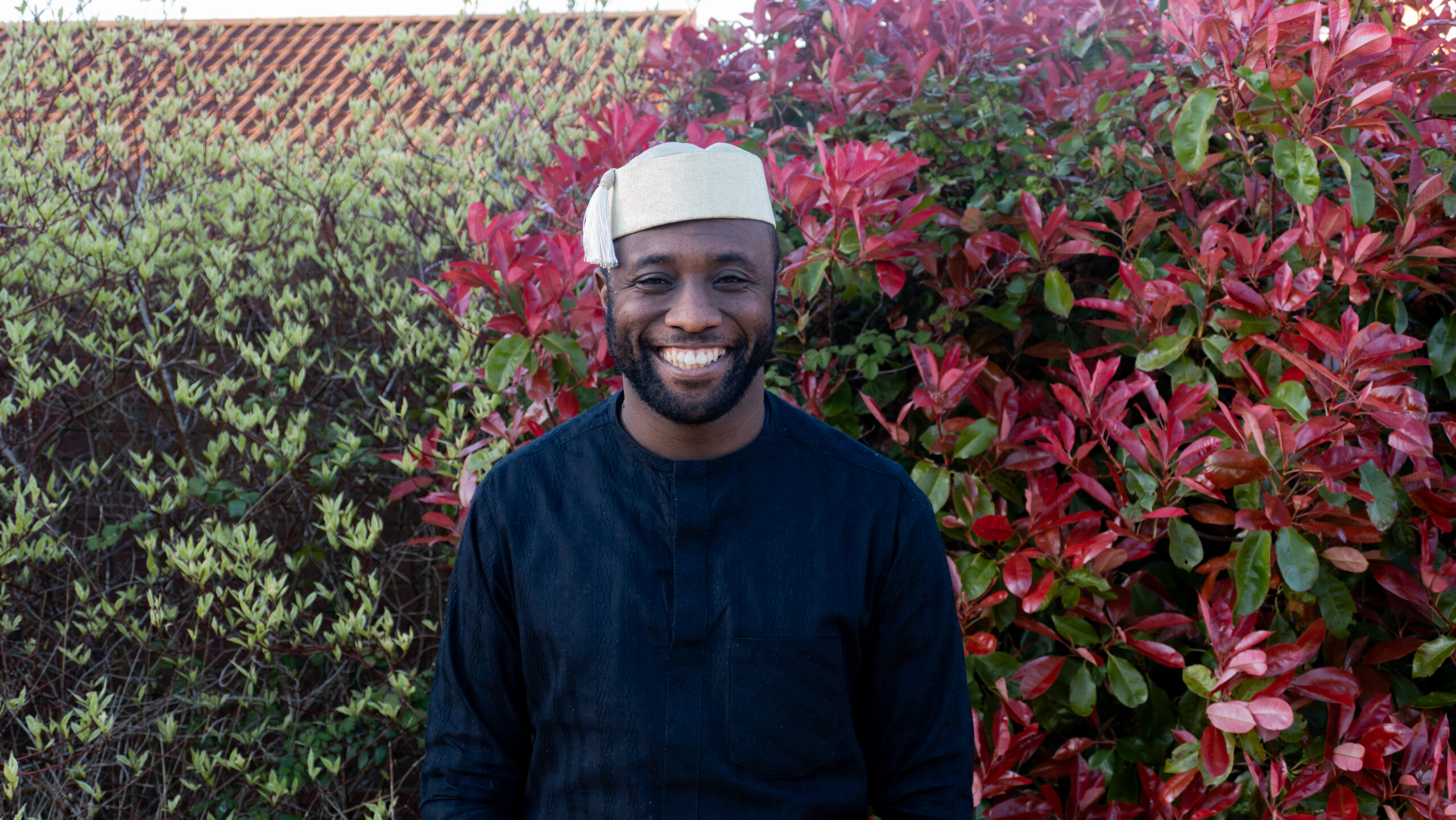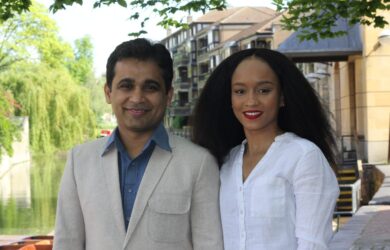
Emmanuel Iduma is an award-winning writer whose PhD will explore the meaning and perception of digital photos
I am not interested in the man vs machine debate. I am interested in the man in the machine conversation: how can a person trained in close looking at photos combine that with computational methods of analysis.
Emmanuel Iduma
Emmanuel Iduma will be one of the first people to do the University of Cambridge’s new PhD in Digital Humanities and he brings a wealth of experience in multimedia to the subject.
Emmanuel [2024] is not only an acclaimed writer, but has been fascinated by the role of photography for many years – how photographs circulate, what they mean and what they are used for in today’s ultra-visual society. “Photography is the primary way people express themselves for the record.” He notes that we are now in an age where there are so many photos taken mainly on phones that they perhaps make the process of close analysis more difficult.
The PhD will build not only on his long-time work with photographers, on a road trip across Africa between 2011 and 2016 and in his book A Stranger’s Pose, but his recently founded African photography newsletter, Tender Photo. Emmanuel set up the newsletter in 2022 and has published over 140 issues so far, each one with a new photo and a statement by the photographer about why they chose to take it.
He began to think about how he could organise and analyse the amount of material he had. “I wondered how I could present this to people using computational or digital methods. I needed the time and space to figure this out and to pick up the critical and technical skills I needed, such as computer vision which helps you understand how computers see images. A PhD offers me that space,” says Emmanuel.
He adds: “These days, algorithms can tell us how to look at photos. I am not interested in the man vs machine debate. I am interested in the man in the machine conversation: how can a person trained in close looking at photos combine that with computational methods of analysis.”
His research will focus on photos from the Biafran War and the more recent Boko Haram conflict, where most of the photos taken are digital. “I want to explore their meaning, how they have circulated and how Nigeria is perceived as a result,” he states.
Childhood
Emmanuel was born in Akure in southwestern Nigeria, but his family come from the southeastern part of the country. His father was a travelling secretary in the Scripture Union and Akure was his first appointment. His father’s family had endured the tragedy of losing a son during the Biafran War and Emmanuel is named after his uncle. His early years were ones of constant change and more tragedy.
The family moved from Akure to Port Harcourt when Emmanuel was one. His mother died there three years later in 1993. At this time, Emmanuel’s father was in the US, having moved there in 1992 to study for a master’s in Divinity before he was ordained as a minister. He stayed in the US until 1996 and Emmanuel and his brother were looked after by a close family friend while his sister lived with another friend.
On his father’s return from the US, he remarried and the family moved to Abuja, Lagos, and then Ile-Ife, where he became a university chaplain. Emmanuel went to boarding school and did well in his exams.
University
He knew by the time he reached the end of secondary school that he wanted to work in the arts, but he wanted to do a university course which gave him a broad education. Law was the only course that really appealed to him and so he signed up for a law degree at Obafemi Awolowo University in 2005. Emmanuel’s love of writing had been clear from an early age and he joined the Association of Campus Journalists in his first year, spending hours every weekend working on articles for a weekly newspaper in the Faculty of Law. He became deputy editor in his second year and an editor one session later. “I was very plugged into the literary community. Being a writer was an identity that seemed more pronounced in me than being a lawyer,” he says.
It was at university that he met the writer Ayọ̀bámi Adébáyọ̀, who would later become his wife. They and another student put together workshops for aspiring writers across the university. For each workshop, the writers would submit their writing and it would be bound and circulated for feedback within the group and an English professor would also provide a critique. “Those experiences were very important,” says Emmanuel. He and Dami Ajayi, one of the workshop participants, went on to found Saraba in 2009, a literary magazine which aims “to create unending voices by publishing the finest emerging writers, with a focus on writers from Nigeria, and other parts of Africa”. It has become one of the most successful literary magazines in and out of Africa. Emmanuel worked on it for 10 years and says it published hundreds of new writers.
First book
In 2012, Emmanuel published his first book, Farad. It was a big moment for him. At the time there were not many literary publishers in Nigeria, but some of today’s big names in fiction were beginning to emerge. He says the transformation in the publishing scene in Nigeria has been remarkable over the last decade or so.
Emmanuel describes Farad as ‘very ambitious’ both stylistically and formally. It features eight interlinked short stories. “It was an interesting experiment,” he says, “and it made me feel more confident as a writer.” The book attracted some attention in Nigeria and a friend who started a publishing house in New York published an edition there in 2016 which gave it a wider circulation.
After his law studies were completed, Emmanuel had to do national youth service. This was delayed by six months because he was on the road trip with photographers. The trip came about because in 2009 when he had taken part in a dance criticism workshop he was introduced to a photographer who had organised a road trip project across Africa. When he was finishing his law studies, Emmanuel saw a Facebook post by the photographer saying he was planning another road trip from Lagos to Addis Ababa so he got in touch and became the blogger for the six-week trip.
Master’s
In 2013 Emmanuel was awarded some funding to go to the US to begin a two-year master’s course at the School of Visual Arts, where he was to study Art Criticism and Writing. It was the first time he had the time to figure out what kind of writing he wanted to do and to begin his professional life as a writer. The chair of his programme, David Levi Strauss, was a well-known art critic who became a mentor to him.
After completing his master’s, Emmanuel was most known for his art criticism, but in 2018, while still in the US, he published A Stranger’s Pose, a book which is described as a unique blend of travelogue, photographs and poetry. “It encompasses my experience of being on the move and being a stranger, something that has been a fact of my life since I was a child,” he says. “I wanted to explore how you view yourself as a stranger in a place rather than viewing other people as strangers.” The book did well critically and was longlisted for the Ondaatje Prize. At the same time, he continued producing more mainstream art writing, mostly for US art journals and curators, and was teaching on the master’s programme he had taken.
In September 2018, while he was in New York, Emmanuel’s father died. He decided to return to Nigeria the following year. In 2020 he married Ayọ̀bámi and in 2021 the couple decided to move to England. It was closer to Nigeria than the US and their families could easily visit. Both were able to work anywhere.
In the UK
In the early days in the UK, Emmanuel, who received the prestigious Windham Campbell Prize in 2022, taught a memoir writing course for the National Centre for Writing, but last year he and his wife had books published, both of which have been big successes.
Emmanuel’s book, I am still with you, retraces the steps of his uncle, who disappeared in the Biafran War. Most non-fiction books about the Biafran War are memoirs by people who lived through it. Emmanuel was not even born when it took place. He says his book is not political, although he had to take a stand on certain issues, and it is not about blame. He has spoken about it at various literary events, including the Edinburgh Book Festival, and finds feedback useful and sometimes unexpected.
Emmanuel is very pleased to have begun his PhD and to have joined the Gates Cambridge community which he says is ‘remarkable’. He says: “My interests are broad and multi-disciplinary. I don’t think I have ever been in an academic community which is so truly diverse. It’s such a rich learning environment.”












